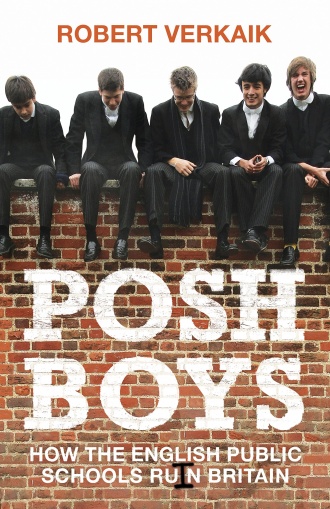This is the last article you can read this month
You can read more article this month
You can read more articles this month
Sorry your limit is up for this month
Reset on:
Please help support the Morning Star by subscribing here
Posh Boys: How the English Public Schools Ruin Britain
by Robert Verkaik
(Oneworld, £16.99)
POSH Boys highlights the pernicious influence of public schools on social division in Britain. But it’s a book with a split personality. Robert Verkaik’s painstaking historical analysis of the rise and maintenance of public school power leads to policy proposals more radical than any seriously contemplated by British governments but there are irritating lapses into superficiality.

The first third of the book traces the history of public schools from the late medieval era, when they were established by the Church to educate the poor, through their reinvention as chartered institutions after the Reformation and into the imperialist 19th century, when they became hothouses of “muscular Christianity.”
There is an interesting aside from this period — the assertion that the Battle of Waterloo was won on the playing fields of Eton is twaddle. The Duke of Wellington hated his short time at the school, which had no playing fields in his day.
Verkaik’s unflinching examination of the sense of entitlement inculcated in the age of Tom Brown’s Schooldays includes the horrific story of a mission to Africa involving the procurement of a child’s murder. The perpetrator, Major Edmund Musgrave Barttelot, became the model for Kurtz in Joseph Conrad’s Heart of Darkness.
He catalogues the challenges to the protected charitable status of public schools and their failure due to resistance from a political establishment – Labour, Tory and Liberal – packed with loyal beneficiaries of the existing system.
Politicians brave enough to push for reform have been hamstrung by accusations of envy or hypocrisy and by the closing of ranks by those loyal to their alma mater.
Posh Boys demonstrates the corrosive impact of networks of privilege on both society and individuals. Sexual bullying is exposed, cronyism called out and criminal cover-ups revealed. Verkaik never loses sight of the biggest issue, the role of public schools in driving inequality, preserving hierarchies and widening the chasm of opportunity between the educationally privileged and the rest.
A chapter covering the “meteoric rise and padded fall” of David Cameron – the Big Society’s answer to the Wizard of Oz – illustrates the ways in which Old Etonians maintain the influence of their school.
Yet there are several shortcomings in Verkaik’s analysis. His suggestion that communities need “pushy” middle-class parents to drive up standards in local schools is patronising and offensive, as it implies that the rest of us are ill-informed, inarticulate and apathetic about our children’s education.
And his assertion that access to education is an essential defence against the impact of mass automation underestimates the threats posed by capitalist technology and reduces education to the status of a gatekeeping process for employers.
Verkaik associates the rise of Jeremy Corbyn with the Trump presidency and Brexit, dismissing it as a symptom of mass resentment of “networks of advantage.” That’s a spectacular oversimplification and such flaws undermine an important book.
Posh Boys proposes interesting and persuasive models of “slow and peaceful euthanasia” for public schools and calls time on a system of privilege that has distorted society without serious challenge for 500 years.










